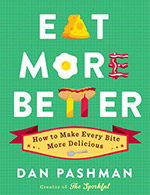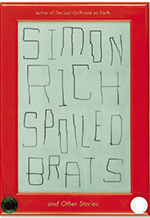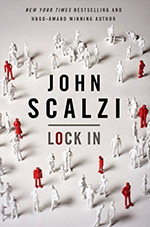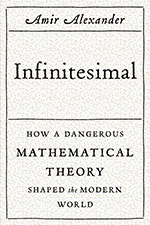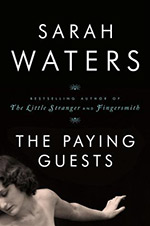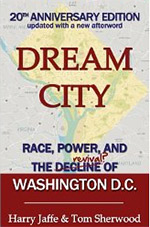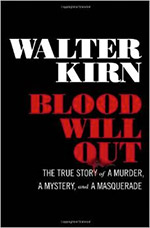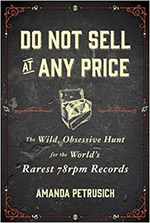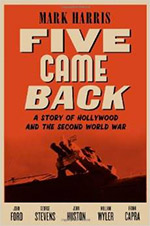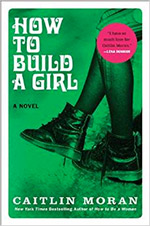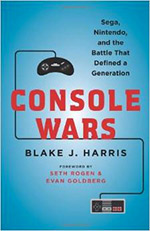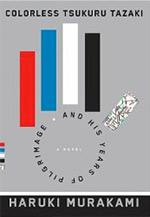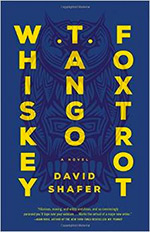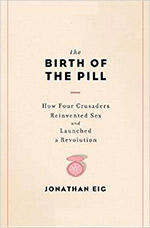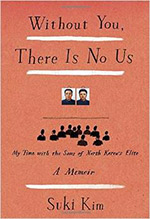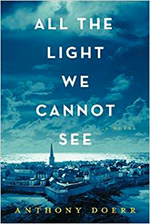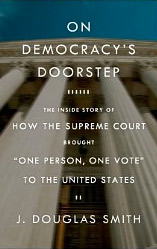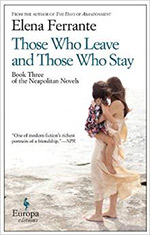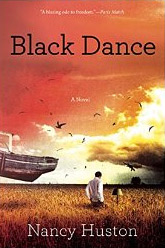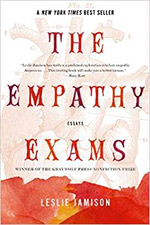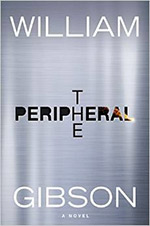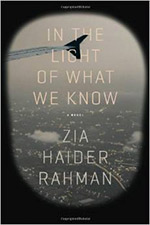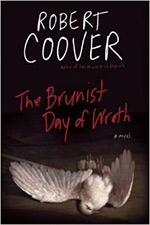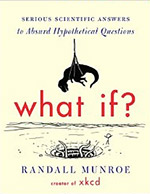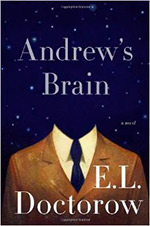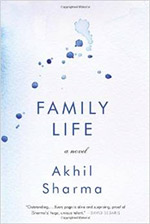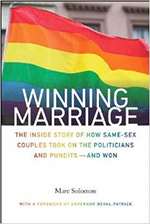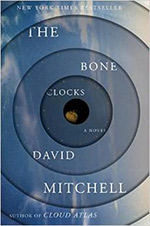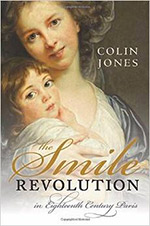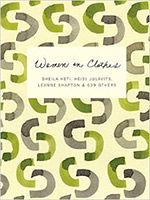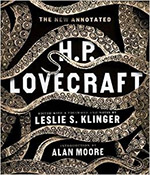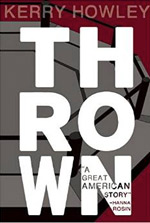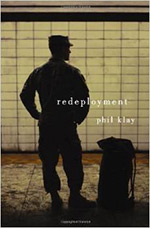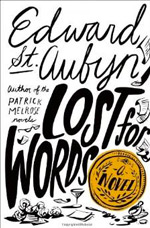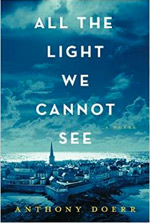
Slate is an Amazon affiliate and may receive a commission from purchases you make through our links.
Best Books 2014: Slate Staff Picks
Slate’s columnists, editors, and bloggers pick their favorite books of the year.
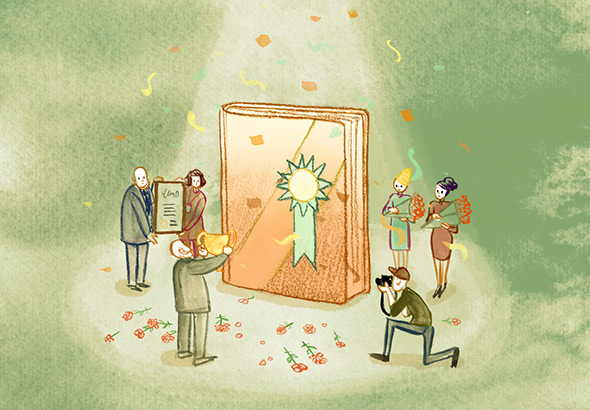
Illustration by Jen Wang
Eat More Better: How to Make Every Bite More Delicious, by Dan Pashman
Recommended by L.V. Anderson, assistant editor
Dan Pashman is a friend of Slate—he adjudicated the Slate Culture Gabfest’s infamous granola contest and co-hosted Table to Farm with me—and a mad food scientist. On his podcast The Sporkful, he devotes his wacky imagination to determining the very best way to eat—well, everything. This year, he published his many insights in the form of a book, Eat More Better: How to Make Every Bite More Delicious. I strongly disagree with some of his conclusions—for instance, that vegetarians need a complicated centerpiece on Thanksgiving, and that it’s OK to cherry-pick through snack mix. But I have no quibbles with the entertaining way he makes his arguments.
Spoiled Brats, by Simon Rich
Recommended by Ben Blatt, staff writer
The newest collection of humorous short stories from writer Simon Rich is a must-read for any fans of the form. The piece Guy Walks into a Bar, about a hard of hearing genie who grants a “12-inch pianist” instead of a “12-inch penis” and ends with a punch line a mental cut above most blue comedy, illustrates Rich’s talent. His humor is equal parts accessible and witty. The book will likely be read in one sitting, both because of its length and ability to make anyone laugh.
Lock In, by John Scalzi
Recommended by Torie Bosch, Future Tense editor
Sci-fi writer John Scalzi’s latest novel is a deeply engrossing detective story, set in a future in which a devastating epidemic of a new disease called Haden’s syndrome has left more than 4 million Americans with lock-in—unable to move their bodies but sound of mind. Thanks to medical and technological advances made possible by unprecedented government research funding, those with lock in are able to navigate the world via mechanical surrogates, nicknamed “threeps” for C-3PO. In some ways, a threep is superior to a human body—it can’t get hurt—but at the same time, Hadens (who hate to be called victims) suffer discrimination and often find that they don’t have much in common with the rest of the world. The murder mystery is decent, but what makes Lock In so special is the fascinating, cohesive world Scalzi sets up, with challenging questions about disability rights, medical research, liability, and social stratification. After you read Lock In, check out the Kindle Single Unlocked: An Oral History of Haden’s Syndrome, which fills in a lot of the backstory about the epidemic and the Haden’s rights movement.
Infinitesimal, by Amir Alexander
Recommended by Boer Deng, editorial assistant
Amir Alexander's Infinitesimal reminds us that the path toward progress has always been difficult. The notion of infinity underpins much of mathematics, but was once rejected even by brilliant Jesuit mathematicians and the philosopher Thomas Hobbes (who actually had a deep interest in Euclidean geometry, and once tried to present the proof for “squaring the circle”—a classic problem later found to be impossible).* Alexander documents the early drama surrounding a revolutionary idea.
The Paying Guests, by Sarah Waters
Recommended by Simon Doonan, Slate columnist and Barneys Creative Ambassador
How can one book be so dismal and so utterly unputdownable? Having been born in a rooming house I resonated wildly with the squalid claustrophobia of shared accommodations, but La Waters is such a good story-teller that you will be sucked in, regardless of how posh your background.
Dream City: Race, Power, and the Decline of Washington, D.C. [20th Anniversary Kindle Edition], by Harry Jaffe and Tom Sherwood
Recommended by Jonathan L. Fischer, senior editor
If you want to understand Marion Barry, the “mayor-for-life” of Washington, D.C., who died this November, start with this magisterial account of his rise in the promising early years of D.C. Home Rule, his fall amid the city’s “murder capital” era, and his comeback in the 1990s. The book was first published in 1994; this 20th-anniversary e-book edition includes a new afterword by the authors connecting the Barry era to today’s moneyed, very different District of Columbia, where the office rents are starting to rival Manhattan’s and municipal leaders express concern about gentrification and displacement, not poverty and the crack epidemic.
Blood Will Out: The True Story of a Murder, a Mystery, and a Masquerade, by Walter Kirn
Recommended by David Haglund, senior editor
Every so often, my wife and I pick a book to read together, aloud. More precisely, I read a chapter or two each night until she falls asleep. Two kinds of books work especially well for this approach, which is hands down my favorite way to read something: 1) funny books and 2) page-turners. Walter Kirn's Blood Will Out, which we read together this past summer, fits the latter category: In it, Kirn describes his messy and, ultimately, somewhat embarrassing relationship with Christian Karl Gerhartsreiter, a German con man who claimed to be a Rockefeller and who was charged with murder in 2011. Kirn not only details Gerhartsreiter's crimes and his subsequent trial, he also investigates his own willingness to be taken in, and why. Kirn ends up feeling that he let himself be duped, in part, as a writer, one who had begun this friendship by giving Gerhartsreiter “the indulgent loyalty that writers reserve for their favorite characters, the ones, it’s said, we can't make up.”
Do Not Sell at Any Price, by Amanda Petrusich
Recommended by Jack Hamilton, pop critic
Petrusich’s fantastic book about old 78rpm records and the oddball heroes who rescue them isn't a history tale so much as a travelogue into the most beautiful corners of obsession. Petrusich is a top-flight music writer—meticulous, generous, and deeply informed. But she’s also a terrific curator of human subjects, from the lovesick collectors who make up the bulk of her narrative to the towering, still-shadowy names that grace these circular hunks of shellac: Blind Lemon Jefferson, Geeshie Wiley, the peerless Charley Patton. Do Not Sell At Any Price is as idiosyncratic, alluring and totally alive as the scratchy sides that consume it, and anyone who'd accuse Petrusich or her protagonists of caring too much about these recordings has probably never heard them.
Five Came Back: A Story of Hollywood and the Second World War, by Mark Harris
Recommended by Aisha Harris, staff writer
Mark Harris is one of the smartest living film essayists today. His first book, Pictures at a Revolution, fascinatingly dissected the five Best Picture nominees of 1967 from a historical and critical standpoint, and Five Came Back takes on a similar and equally winning formula, this time by looking at five renowned Hollywood directors—Frank Capra, John Ford, William Wyler, John Huston, and George Stevens—and their cinematic and militaristic contributions to World War II. The book will easily please both film buffs and history buffs.
How to Build a Girl, by Caitlin Moran
Recommended by Amanda Hess, staff writer
Of all the 2014 hardbacks aimed at the blossoming niece demographic (Lena Dunham’s Not That Kind of Girl, Amy Poehler’s Yes Please!, Megan Amram's Science … for Her!), Moran's book is the one I most want to plant in the hands of the nearest 13-year-old girl. Like her fellow pop-feminist famous ladies, Moran mines her own witty wunderkind bio for bildungsroman fodder (How to Build A Girl’s teen rock critic protagonist, Johanna Morrigan, is Moran by another name). But Moran’s fictionalized approach frees her to get realer than the celebrity memoir genre typically allows: Where her compatriots detour into euphemisms and platitudes for PR purposes, Moran delivers deliciously graphic details about what really happens when a teenage girl enters a man’s world.
Console Wars, by Blake J. Harris
Recommended by Derreck Johnson, designer
Console Wars is a deep and thorough dive into the intense rivalry between the Sega and Nintendo video game companies in the 1990s. As a former owner of an NES, a Sega Genesis, an N64 and a Sega Dreamcast, I can say with confidence that it doesn’t get any more informative than this.
The Blazing World, by Siri Hustvedt.
Recommended by Fred Kaplan, contributor
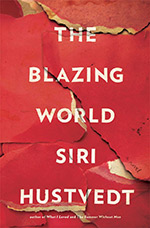
This is a masterpiece of a novel. It's about an extremely intelligent woman in the art world, hamstrung by the sexism of the era in which she grew up, but it's about much more than art and gender; it's about love, life, family, friendship, betrayal—yes, this sounds clichéd, but it's true. It's also a technical tour de force of Nabokovian proportions, told as fragments—diary entries, oral history interviews, gallery notices, and footnotes by the putative editor piecing them together in a maze-like search for truth. A dozen or so voices pierce through, and Hustvedt (who is also an astute art critic and polymath) inhabits them all. It delivers an emotional wallop, too.
Colorless Tsukuru Tazaki and His Years of Pilgrimage, by Haruki Murakami
Recommended by Chris Kirk, interactives editor
A man searches for answers a decade after his close-knit high school clique inexplicably ostracizes him. It’s a reflective quest through aging and alienation, and every reader will experience it differently, but it will speak most to anyone who has ever lost friends, whether by a dispute, death, or merely the diverging circumstances of life.
Whiskey Tango Foxtrot, by David Shafer
Recommended by Dan Kois, culture editor
I really loved this weird, funny techno-thriller, in which three somewhat lost souls—Leila, an NGO worker who sees something she shouldn’t in Myanmar; Leo, a fired nursery school teacher who writes manifestoes in Portland; Mark, who accidentally ended up the in-house guru to a CEO who is maybe totally evil—uncover, yes, a conspiracy. But the conspiracy, while zingy, is the least exciting part of Whiskey Tango Foxtrot. Instead I enjoyed watching Shafer’s appealing screw-ups fall in with each other, finding kindred spirits and a common enemy. And I thrilled to Shafer’s language, which is clever and humane, as when Leo complains about how far he’s sunk: “Then his pot dealer cut him off. Out of concern! Like pot dealers are bound by the Hippocratic oath.”
The Birth of the Pill: How Four Crusaders Reinvented Sex and Launched a Revolution by Jonathan Eig
Recommended by Miriam Krule, assistant editor
The 10th-grade history teacher at my religious high school liked to ruffle feathers by telling his students that the pill was the most important invention of the 20th century—for what it’s worth, Jonathan Eig was inspired to write this book after hearing something similar in a rabbi’s sermon. Indeed, it’s not really a feather-ruffling statement; it’s a fairly easy argument to make when you think about it, and especially after you read Eig’s well-crafted and comprehensive account of the four main shakers who brought the pill from an idea to, as the title suggests, a revolution. But you don’t need me to tell you what you already know about how the pill has allowed women to choose their own fate or that women’s reproductive health has become one of the most contentious topics in today’s political landscape. You will, on the other hand, appreciate how Eig explains why the pill has reached the iconic status that no other pill seems to have achieved, or for that matter, any other product. As Eig writes, there’s “no such thing as The Soap or The Vacuum or The Car.” What Eig does, as Margret Talbot explains in The New Yorker, is tell the story of a pill that “matters so much, in ways both thrillingly intimate and sweepingly sociological.”
Without You, There Is No Us: My Time With the Sons of North Korea’s Elite , by Suki Kim
Recommended by Jennifer Lai, associate editor Slate Plus
It’s rare to find a book on the hermit kingdom as personal as Korean-born American journalist Suki Kim’s devastatingly vulnerable account of teaching English in North Korea. Disguised as a missionary and teacher at Pyongyang’s University of Science and Technology for six months before Kim Jong-il’s death in 2011, Kim risked imprisonment on a daily basis—by merely forming friendships with her students, the most privileged sons of the regime’s ruling class, and then taking notes on forbidden USB drives. Though Without You, There Is No Us does honestly illuminate the lives of her pupils—private lives revealed to be fraught with fear, lies, constraint, restrained curiosity, and suspicion—let me be perfectly clear that Kim’s account is not so much an expose of the country as it is an intensely personal story of her own loneliness, profound isolation, and constant mind-numbing fear. Kim’s stark and delicate language, intertwined with the suspense of being an undercover journalist in a foreign-yet-familiar land, truly humanized North Korea for me.
All the Light We Cannot See, by Anthony Doerr
Recommended by Rachael Larimore, senior editor
Doerr has crafted a hauntingly beautiful exploration of how good people react to the presence of evil. Experience the rise of Hitler and the German occupation of France through the eyes of two children: Marie-Laure, a blind French girl whose widowed father helps her “see” through lovingly crafted models of Paris and the seaside town to which they flee; and Werner, a frail German orphan whose bright mind and knack for building and fixing radios gets him sent to a school that is training the elite of the Third Reich. That might sound like a coming-of-age tale, but Doerr’s narrative is so much more. There are unexpected acts of bravery, and heartbreaking acts of cowardice. Oh, and a 133-carat blue diamond with a red center. The diamond may or may not be cursed, but it definitely impacts the lives of the central characters.
On Democracy's Doorstep: The Inside Story of How the Supreme Court Brought “One Person, One Vote” to the United States, by J. Douglas Smith
Recommended by Dahlia Lithwick, courts correspondent
The backstory of “one person, one vote” in this country, and Smith’s framing of how we got here, has shaped the way I thought about voting all year. It is both carefully researched and well told.
Those Who Leave and Those Who Stay, by Elena Ferrante
Recommended by Seth Maxon, home page editor
I’d like to nominate the Neopolitan Novels by Elena Ferrante. The series, which consists of My Brilliant Friend, The Story of a New Name, and Those Who Leave and Those Who Stay, which came out this fall—contains some of the richest, loveliest prose I’ve read in many years. The story’s world—that of Lila and Lenu, two intelligent girls who grow up as competitive best friends amid working class Naples in the 1950s, and pursue divergent educational and romantic lives—is as beautifully rendered as it is darkly inhabited, by the ugliness of classism, domestic and sexual violence, and adolescent dread. Despite that darkness, the books bleed empathy.
Black Dance, by Nancy Huston
Recommended by Abby McIntyre, copy editor
Canadian author Nancy Huston is one of my favorite working writers, and her latest novel, Black Dance, captures what’s so great about her writing. This multigenerational tale—think Zadie Smith or Michael Ondaatje—spans Dublin’s 1916 Easter Rising, rural Quebec, and Montreal’s midcentury underclass to tap into questions of (multi)cultural identity, creativity, and childhood awakenings. It quite literally braids together the lives of its characters in a fluid, sensory way. And with the help of the book’s screenplay framing, Huston, who self-translates her own work from French to English, packs all of this into a tight, fast read.
The Empathy Exams, by Leslie Jamison
Recommended by Mark O’Connell, books columnist
I feel as though in my Slate Book Review piece last April I probably praised Leslie Jamison’s essay collection The Empathy Exams about as lavishly as I’ve ever praised any book, and that therefore all I can really do here is repeat myself. But it’s worth doing so with a book as vital and exhilarating as this, which manages to be at once so emotionally raw and elegantly composed. Jamison approaches the central theme of pain—her own pain, and that of others—from a number of different angles, combining memoir, reportage, and literary criticism to powerful formal effect. Her writing pulses with a humane intelligence, and a relentless, sometimes discomforting, curiosity about the reality of suffering, about what it feels like to feel. If we’re going to insist on keeping score with these things, it was my favorite book of the year.
The Peripheral, by William Gibson
Recommended by Rebecca Onion, blogger for The Vault.
Set in two different futures, one near (in West Virginia) and one far (in London), The Peripheral packs in ideas: How would the widespread adoption of 3-D printing change manufacturing and retail? If we physically modify soldiers using haptic implants, how could they ever recover from combat? If global warming kills off most of humanity and the animal world at the same time that we invent serviceable nanotechnologic robots, how would the surviving humans modify the landscape and reshape their social lives? This is a lot to absorb, and I often found myself flicking back pages to make sure I was understanding the book correctly. But Gibson also provides the reader with a set of characters that merit emotional investment, so you never feel awash in all the grim speculation.
In the Light of What We Know by Zia Haider Rahman
Recommended by Willa Paskin, TV critic
As Haider Rahman’s debut novel begins, an old Oxford friend shows up on the nameless narrator’s doorstep. Both men are of South Asian descent, but from different classes, and they have lost touch over the years. Zafar, the friend, moves in, his life in shambles, even as the narrator’s marriage and job, as a high-level trader, start to implode too. Despite the chaos surrounding both men, what they do each night is talk: ideas are more alive to them than most other people. They make extremely erudite, felt conversation about contemporary geopolitics, Wall Street, math, Bangladesh, England, Islam, racism, philosophy, money, family, romance, rape, and immigration, among many other heady topics, all as Zafar slowly, piecemeal, explains what's happened to him these past years. Their discussion is never less than fascinating—this is the sort of book that just leaves you feeling smarter, if only temporarily—even as their chatter becomes more and more obviously a scrim, conversation as something to hide behind and a means to work things through. As discursive and learned as the novel can be—did I mention all the theory about math?—it is ultimately a plaintive and moving portrait of male friendship and alienation that leads up to devastating, honest, genuinely thought-provoking exploration of sexual violence.
The Brunist Day of Wrath, by Robert Coover
Recommended by Justin Peters, correspondent
In 1966, Robert Coover published The Origin of the Brunists, a ferociously imaginative novel about the rise of an apocalyptic religious cult in a small mining town. In 2014, he published the sequel, and, good grief, it was worth the 48-year wait. The Brunist Day of Wrath picks up the story five years after the events of the first book, as the cultists return to West Condon to await Armageddon. From that premise, Coover spins a gloriously ambitious 1,100-page disquisition on the varieties of American megalomania, and how the unencumbered, literate imagination is the only true defense against all that which is small and untrue. “Language makes and unmakes reality,” says Sally Elliott, the aspiring writer character who serves as Coover's stand-in. “There’s an unfathomable gap between nature and culture, the infinite and the finite. Only the imagination can even try to bridge it.” For decades, Coover has worked within that gap. The least complacent major writer of our time, Coover is 82 now, and The Brunist Day of Wrath may well be his valedictory work. If so, damn, it gives new meaning to the phrase “going out on top.” More immediately approachable than some of his more overtly experimental fiction, yet just as ambitious and technically impressive, The Brunist Day of Wrath is the smartest, most vital novel I’ve read in years.
What If? Serious Scientific Answers to Absurd Hypothetical Questions, by Randall Munroe
Recommended by Phil Plait, Bad Astronomy blogger
If you know Randall Munroe's xkcd and what if? Web comics, then you don't need me plugging them. But if you don’t, Munroe's hugely popular comics explore the human side of geekery in a funny and charming way. His what if? comic answers readers’ questions, usually about pushing an idea to its limits. If you suddenly starting rising at 1 foot per second, what would kill you first? Is it possible to build a jetpack with downward-firing machine guns? If everyone on Earth pointed a laser pointer at the Moon at the same time, would its color change? When will the dead outnumber the living on Facebook?
The book is fun, funny, and you'll learn something cool. Probably lots of somethings cool.
Andrew’s Brain, by E.L. Doctorow
Recommended by Ron Rosenbaum, contributor
This E.L. Doctorow novel is deceptive: less Ragtime, more Blade Runner. A cerebral Blade Runner, it’s true. Still, at its heart is the same urgent question of the ever-narrowing borderline between human and replicant consciousness.
The novel is one of those fictions that are so intellectually fizzy I fear Doctorow’s singular sense of oncoming catastrophe has gotten lost even among the plaudits it’s received. There’s a lot of deliberate misdirection, but at its core, the book has a frightening vision of the future. About the unthinking hubris of a certain strain of neuroscience. The strain that still hasn't got a clue to “The Hard Problem of Consciousness,” as it’s called, and is flying blind toward the singularity Silicon Valley ignorantly worships.
In Doctorow's mind, in Andrew’s Brain anyway, there’s profound danger ahead for human identity: “If we figure out how the brain gives us consciousness [that’s “the hard problem”] … we will have learned to replicate consciousness ... and with that the end of the mythic human world we’ve had since the Bronze Age. The end of … all the stories we’ve told ourselves until now.”
If they can replicate your consciousness, then who are you? Which are you? Read and wonder.
Family Life, by Akhil Sharma
Recommended by Sharan Shetty, Brow Beat writer
This is my best book of the year, but it’s also one that, upon first reading, didn’t impress. Labeled as fiction, the novel is essentially Sharma’s story: an Indian family emigrates to Queens and begins a decade of torment when the older son, one of two, dives into a shallow pool, hits his head on the cement bottom, and suffers catastrophic brain damage. To capture this period of his life, Sharma wrote 7,000 pages over almost 13 years. The final book is 224 pages long, and written in bare, straightforward, almost skeletal prose. But this is more than an exercise in restraint: The book has a density rooted in a sneaky accretion of detail. You may feel bored and detached from Sharma’s brutally unsentimental voice; you may feel his exploration of immigrant life and identity struggles to find purchase; you may feel his style undermines his substance. Then you read the last few pages and feel like you’ve been punched in the gut.
Winning Marriage, by Marc Solomon
Recommended by Mark Joseph Stern, contributor
The first half of 2014 saw the publication of two awful books purporting to tell the history of gay marriage, one irritatingly gauzy, the other astonishingly myopic. So the gay blogosphere heaved a collective sigh of relief when Marc Solomon’s adrenaline rush of a book hit the shelves this fall. Winning Marriage is the only account of the gay rights battle yet written that will still be read in decades to come. It’s a timeless story of a fierce and vital fight, fast-paced and marvelously detailed. Once or twice, it even brought this cynic to tears.
The Bone Clocks, by David Mitchell
Recommended by Seth Stevenson, contributor
I’ve now gobbled up each of David Mitchell’s six very different novels. I especially adore the virtuosic genre melding of Cloud Atlas; the nuanced YA lit of Black Swan Green; and the vivid historical fiction of The Thousand Autumns of Jacob de Zoet. Mitchell’s latest work, The Bone Clocks, is another one of his ambitious, time-hopping yarns—part 1980s teen romance, part contemporary jet-setting comedy, part futuristic cautionary tale. I confess that Mitchell’s fascination with supernatural plot points is beginning to leave me cold. But his finest qualities remain on display here: spritely prose, suspenseful set pieces, and a boundless imagination. No one’s better than Mitchell at portraying humans’ knack for creepy, ice-cold predation.
The Smile Revolution in 18th -Century Paris, by Colin Jones
Recommended by June Thomas, editor of Outward
The cover of this ridiculously erudite book features a self-portrait Élisabeth-Louise Vigée Le Brun exhibited at the Paris Salon in the fall of 1787. At first glance, it seems quite unremarkable, but Colin Jones, a British professor of history, makes a convincing case that this painting—which, in presenting its subject with an open-mouthed smile, broke with the convention that bared teeth signified vulgarity or madness—represents a transformative moment in the history of art. In just 180 pages, Jones manages to be brilliant about painting, French literature and history, the sociology of emotional expression, and the hucksterish early history of the dental profession.
Women in Clothes, by Sheila Heti
Recommended by Julia Turner, editor in chief
Women in Clothes sounds like a book about fashion, but it’s really a piece of anthropology. This fascinating collection of essays, photographs, drawings, lists, and interviews—encompassing input from 642 contributors—understands that how women dress usually has less to do with whatever concatenation of seams and shoulders teetered down a recent runway, and much more to do with history, family, mood, motive and means. Compiled by Sheila Heti, Heidi Julavits, and Leanne Shapton, it tells the stories of why women wear what they wear, how some outfits are armor and others art. (And still others just what was clean.) You learn about mysterious Hasidic undergarments, the talismanic meanings of women’s rings, the fact that a startling number of women feel most beautiful hung over, and why Lena Dunham would rather have great style than great taste: “Style is a feeling that no one else could have put on what you’re wearing that day because it sprung forth from your unique neon mind.”
The New Annotated H.P. Lovecraft, by Leslie S. Klinger
Recommended by Chris Wade, video producer
The New Annotated H.P Lovecraft features 22 of Lovecraft's most significant stories, with new, original annotation by Leslie Klinger. Klinger's research deep, almost comprehensive, and provides great background situating Lovecraft’s fictional New England within the world and experiences he drew inspiration from, often providing new and unnoticed connections within the Loftcraft mythos. But mostly, this beautifully designed, tome-like edition is a definitive presentation of cosmic horror that's maybe the first and/or last collection H.P. Lovecraft stories any new comer or true fan need own.
Thrown, by Kerry Howley
Recommended by Katy Waldman, words correspondent
Thrown, a work of lightly fictionalized, first-person sports reporting, is the essayist Howley’s book debut. A cerebral young woman gets sucked into the world of mixed martial arts, becoming a “space taker” for two cage warriors—rising star Erik and fading, out-of-shape Sean. Prickly, pretentious Kit believes MMA fights hold the secret to transcendent experience (she’s a phenomenology grad student), but Thrown is too unconventional to simply laugh at her or critique the glorification of violence. It pounds you with exhilarating, sometimes heartbreaking, descriptions of combat; wafts pungent jokes over your nostrils; stomps cathartically on your face with passages that force you to submit to the ring’s lyricism:
Everything is waiting. He waits for Pettis to put on some pads so he can punch them and he waits for the seventh fight to end and the eighth fight to end and he waits for the room-rocking thump-thump of his entrance music and waits for Duke and Pettis to gather behind him with his banner and waits for Pettis to slather Vaseline on his face and then he is in the cage, finally in the cage … and he waits for the cry of Cisco’s crowd to move up through his feet to the tips of his fingernails and something is gathering and then finally Steve Mazzagatti, a man Erik has watched from a couch in Iowa referee fights for years and years, says ‘Let’s get it on,’ and Erik begins to sway.
Bonus: Pairs well with the movie Foxcatcher.
Redeployment, by Phil Klay
Recommended by Megan Wiegand, copy chief
In a year of outstanding short-story offerings—Lorrie Moore’s Bark, Molly Antopol’s UnAmericans, among others—only Phil Klay’s Redeployment left me greedily wishing for more after every tale. Klay, a former Marine who served in Iraq, lushly explores what he calls “the gap between public mythology and lived experience” of war, from the front lines of Iraq and Afghanistan to the home front, through 12 distinct, complex, flawed narrators. Dexter Filkins, himself a celebrated chronicler of war, describes Klay’s stories in the New York Times as “the best thing written so far on what the war did to people’s souls.” Redeployment is not only one of the best books of 2014 (and a National Book Award winner)—it deserves a place among the most moving, visceral war literature of our time.
Lost for Words, by Edward St. Aubyn
Recommended by Betsy Woodruff, staff writer
This book should have been really terrible, but instead (hooray!) it's just unbelievably good. It follows the stories of the authors competing for a prestigious British literary prize, and the judges who pick its winner. It could have been navel-gazey and awful, given that author Edward St. Aubyn seems intimately acquainted with the real world of British literary prizes. But instead, it’s really funny and brutal and thoughtful. If you're an English major who just can't move on or if you want to read a novel that’s smart but not that smart, you won’t do better.
All the Light We Cannot See, by Anthony Doerr
Recommended by Emily Yoffe, Dear Prudence columnist
The rapturous reviews overcame my reluctance to pick up a novel about two children swept up in World War II: a blind French girl and a German radio genius. The rapture was right. This book will take you inside the lives and minds of two brilliant, extraordinary young people, caught up in catastrophic events. The writing is exquisite and the plot propulsive—it’s a transcendent book.
---
Slate’s Best Books of 2014 coverage:
Monday: Slate staff picks.
Tuesday: The best lines of 2014.
Wednesday: Overlooked books of 2014.
Thursday: Dan Kois’ favorite books of the year.
Friday: The Slate Book Review Top 10.
See all the pieces in this month’s Slate Book Review.
Sign up for the Slate Book Review monthly newsletter.
* Correction, Dec. 1, 2014: This article originally misspelled Thomas Hobbes’ last name.
Update, Dec. 2, 2014: This article has been updated to include additional staff recomendations.
